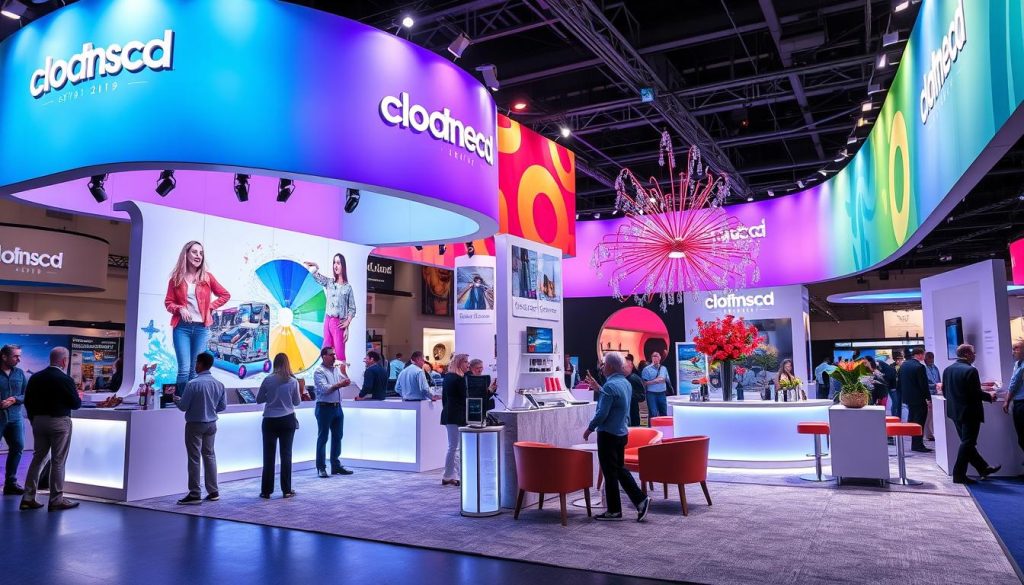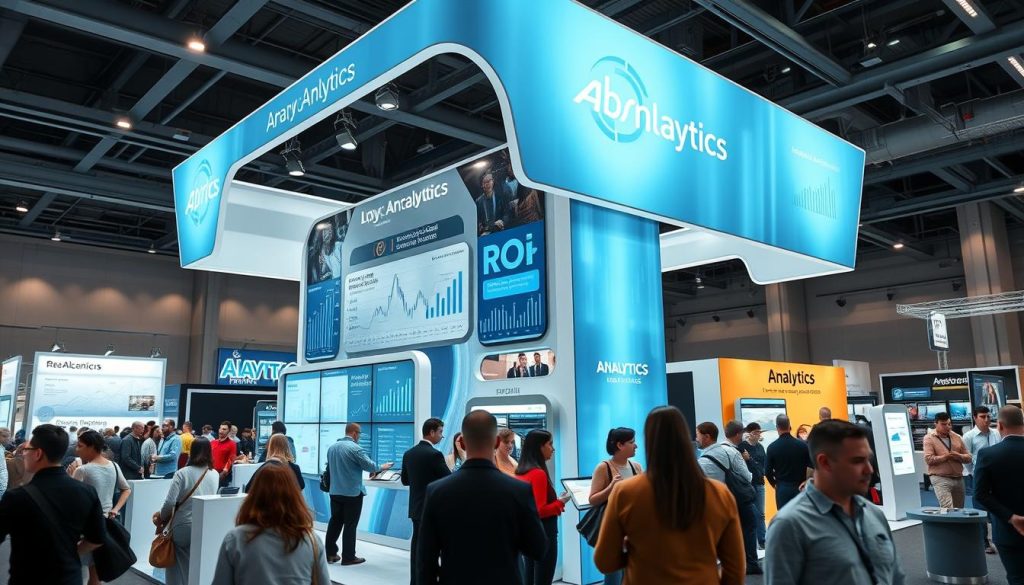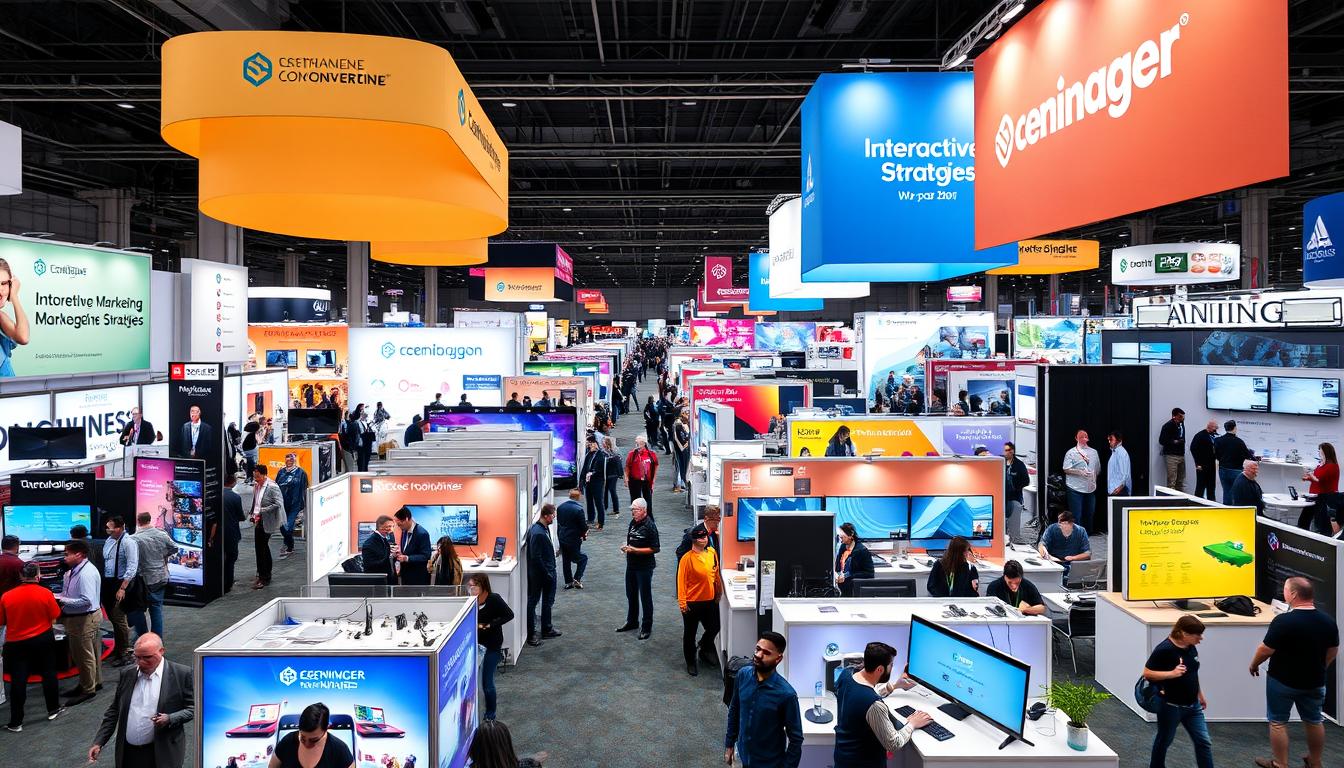Gone are the days of passive brochure handouts at trade shows. Today’s expos demand a fresh approach to lead generation. Interactive marketing is taking center stage, transforming how businesses connect with potential clients. By leveraging engaging games and experiences, companies are not just collecting business cards – they’re creating memorable interactions that lead to high-quality leads.
This shift in trade show strategy reflects a deeper understanding of attendee behavior. People are drawn to booths that offer more than just information. They want experiences that are fun, challenging, and rewarding. By tapping into this desire, businesses are seeing a significant uptick in both the quantity and quality of leads generated at expos.
Interactive elements at trade show booths do more than just attract attention. They provide valuable insights into attendee interests and behaviors. This data becomes a goldmine for sales teams, allowing for more targeted follow-ups and higher conversion rates. It’s a win-win: attendees enjoy their expo experience, while businesses walk away with better-qualified leads.
Key Takeaways
- Interactive marketing boosts lead quality at trade shows
- Gamification enhances attendee engagement and memory retention
- Data collected through games provides valuable sales insights
- Experiential booths stand out in crowded expo halls
- Interactive elements facilitate natural conversations with potential clients
- Modern lead capture methods outperform traditional approaches
Understanding the Evolution of Lead Generation at Trade Shows
Trade shows have long been a cornerstone of event marketing. The way businesses capture leads at these expos has changed dramatically over the years. Let’s explore this evolution and its impact on customer engagement and lead generation.
Traditional vs Modern Lead Capture Methods
Gone are the days of paper business cards and handwritten notes. Today’s expo floor buzzes with digital tools that streamline lead capture. Modern lead generation techniques include QR code scanning, mobile apps, and even AI-powered chatbots that engage visitors instantly.
The Digital Transformation of Expo Marketing
Expo marketing has undergone a digital makeover. Interactive displays, virtual reality demos, and social media integrations now dominate booth designs. These tech-savvy approaches not only attract more visitors but also provide richer data for lead qualification.
Key Metrics for Measuring Lead Quality
Measuring lead quality has evolved beyond counting business cards. Smart event marketers now track:
- Engagement time at booths
- Content downloaded by visitors
- Follow-up email open rates
- Social media interactions post-event
These metrics offer deeper insights into a lead’s potential value, helping businesses refine their sales funnels for better conversion rates.
“The future of expo lead generation lies in creating memorable experiences that naturally compel visitors to share their information.”
By embracing these changes, businesses can transform their expo presence from a simple booth to a powerful lead generation engine, driving customer engagement and boosting ROI.
The Psychology Behind Interactive Marketing at Expos
Experiential marketing at expos taps into core human desires. People crave connection, recognition, and fun. Interactive booths satisfy these needs, creating memorable brand experiences.
Games and challenges trigger our competitive nature. We love to win, even if the prize is small. This drive boosts customer engagement at expos. Visitors actively participate, forming stronger bonds with brands.
Brand activation through interactive elements works on multiple levels. It captures attention in busy expo halls. It also engages multiple senses, making the experience more vivid and lasting. This multi-sensory approach helps brands stand out in visitors’ minds long after the event.
The psychology of interactive marketing also leverages social proof. When people see others engaged with a booth, they’re drawn to join. This creates a snowball effect of participation.
“Interactive marketing at expos isn’t just fun and games. It’s a strategic approach rooted in human psychology, designed to create lasting impressions and valuable leads.”
Understanding these psychological principles can help brands design more effective expo strategies. By tapping into human nature, they can create experiences that resonate deeply with visitors, driving both engagement and conversions.
| Psychological Principle | Marketing Application | Expected Outcome |
|---|---|---|
| Desire for Connection | Interactive Booth Design | Increased Brand Affinity |
| Competitive Drive | Gamification Elements | Higher Participation Rates |
| Multi-Sensory Engagement | Immersive Experiences | Stronger Memory Formation |
| Social Proof | Visible Participation | Attraction of More Visitors |
Gamification Strategies That Convert Visitors into Qualified Leads
Gamification transforms expo marketing, turning passive visitors into engaged leads. By blending interactive marketing with lead generation, businesses create memorable experiences that drive results.
Digital Scavenger Hunts and Prize Mechanics
Digital scavenger hunts captivate attendees, encouraging booth exploration. Participants scan QR codes or use mobile apps to collect virtual items, earning points for prizes. This gamification technique boosts engagement and gathers valuable lead data.
Virtual Reality Experiences
VR offers immersive product demonstrations, transporting visitors to virtual worlds. These interactive experiences create lasting impressions, making your brand unforgettable. VR games can generate qualified leads by capturing user preferences and interactions.
Interactive Touch Screen Games
Touch screen games blend education and entertainment. Trivia contests, product matchups, or custom-designed challenges engage visitors while showcasing your offerings. These games collect lead information seamlessly, making follow-ups more targeted.
Social Media Integration Games
Leverage social platforms to extend your reach beyond the expo floor. Photo contests, hashtag challenges, or live polling games encourage social sharing, amplifying your brand’s presence. These strategies turn attendees into brand advocates, expanding your lead pool.
| Gamification Strategy | Lead Generation Potential | Engagement Level |
|---|---|---|
| Digital Scavenger Hunts | High | Very High |
| Virtual Reality Experiences | Medium | Extremely High |
| Touch Screen Games | High | High |
| Social Media Games | Very High | Medium |
Designing an Engaging Booth Experience
Crafting a captivating booth design is crucial for successful event marketing. An engaging booth experience blends creativity, technology, and strategic planning to attract and convert high-quality leads.

Space Optimization for Interactive Elements
Effective booth design maximizes every square foot. Create zones for interactive games, product demos, and quiet conversation areas. This layout encourages visitors to explore and engage, boosting your experiential marketing efforts.
Technology Integration Best Practices
Seamlessly incorporate technology into your booth design. Use tablets for quick surveys, large touchscreens for interactive presentations, and VR headsets for immersive product experiences. These tech elements enhance visitor engagement and data collection, offering valuable insights into potential customers’ interests.
Traffic Flow Management
Smart traffic flow design is key to a successful event marketing strategy. Use strategic signage, open layouts, and clear pathways to guide visitors through your booth. This approach ensures everyone experiences your key messaging and interactive elements, maximizing lead generation opportunities.
| Booth Design Element | Purpose | Impact on Lead Generation |
|---|---|---|
| Interactive Games | Engage visitors | Increases dwell time and data collection |
| Tech Integration | Showcase products/services | Enhances visitor understanding and interest |
| Open Layout | Manage traffic flow | Ensures exposure to all booth elements |
Engagement Matters: How Games Drive Better Leads at Expos
Games at expos are not just for fun. They’re powerful tools for generating high-quality leads. Interactive marketing through games creates memorable experiences, making your brand stand out in a sea of booths.
Studies show that gamified lead capture can increase engagement by up to 70%. This boost in interaction translates to more qualified leads. For example, a tech company using a VR puzzle game at their booth saw a 45% increase in lead quality compared to traditional methods.
Here’s why games drive better leads at expos:
- Longer booth interactions
- Increased data collection opportunities
- Enhanced brand recall
- Higher lead conversion rates
One effective strategy is using lead-capture eBooks as prizes for game winners. This approach not only attracts potential clients but also provides valuable information, establishing your expertise in the field.
“Games at expos turn passive observers into active participants, creating a goldmine of qualified leads.”
By incorporating games into your expo strategy, you’re not just collecting contact information. You’re creating meaningful connections that lead to long-term business relationships. Remember, in the world of expos, engagement is king, and games are the crown jewels of interactive marketing.
Lead Capture Technology and Tools
Trade shows offer prime opportunities for lead generation. Modern tech tools have revolutionized how businesses capture and manage leads at these events. Let’s explore some cutting-edge solutions that boost customer engagement and streamline the lead capture process.
Mobile Apps for Lead Scanning
Gone are the days of paper forms and business cards. Mobile apps now allow exhibitors to scan badges instantly, capturing visitor data with a simple tap. These apps often include features like custom surveys and note-taking, enriching lead profiles on the spot.
CRM Integration Solutions
Seamless integration between lead capture tools and Customer Relationship Management (CRM) systems is crucial. This connection ensures that leads flow directly into your sales pipeline, ready for follow-up. Many lead capture eBooks highlight the importance of such integrations for effective lead nurturing.
Real-time Lead Scoring Systems
Advanced lead scoring systems use AI to evaluate leads in real-time. These tools analyze visitor interactions, booth dwell time, and responses to qualify leads instantly. This allows sales teams to prioritize high-potential prospects and tailor their approach for maximum impact.
| Technology | Benefits | Impact on Lead Generation |
|---|---|---|
| Mobile Scanning Apps | Quick data capture, reduced errors | Increased lead volume, improved accuracy |
| CRM Integration | Streamlined workflow, faster follow-ups | Enhanced lead nurturing, higher conversion rates |
| Real-time Scoring | Instant lead qualification, targeted engagement | Optimized sales efforts, better ROI |
By leveraging these technologies, businesses can transform their trade show presence into a powerful lead generation engine. The key is to choose tools that align with your specific goals and integrate smoothly with your existing systems.
Post-Event Lead Nurturing Strategies
After the expo buzz fades, the real work begins. Effective lead nurturing turns expo contacts into valuable business relationships. Smart companies use data from interactive games to tailor their follow-up strategies.
Quick response is key. Reach out within 24 hours to keep your brand fresh in prospects’ minds. Personalize your messages based on booth interactions. Did they play a VR game? Mention it in your email.
Create a lead generation funnel with targeted content. Send helpful resources related to their interests. This builds trust and positions you as an industry expert.
- Use automated email sequences
- Share relevant case studies
- Invite leads to webinars or demos
Track engagement metrics to refine your approach. Which emails get opened? What content drives clicks? Use this data to improve your customer engagement strategy over time.
Remember, brand activation doesn’t end at the expo. Keep the conversation going with social media touchpoints. Share behind-the-scenes content or expo highlights to maintain momentum.
“The fortune is in the follow-up. Nurture your leads with care, and they’ll bloom into lasting partnerships.”
By implementing these strategies, you’ll turn your expo leads into a steady stream of business opportunities.
ROI Measurement and Analytics
Measuring return on investment at trade shows is crucial for event marketing success. By tracking key metrics, you can optimize your lead generation strategies and boost your bottom line.
Key Performance Indicators
To gauge the effectiveness of your event marketing efforts, focus on these KPIs:
- Number of booth visitors
- Leads captured
- Conversion rate
- Cost per lead
- Sales generated

Data Analysis Tools
Leverage powerful tools to analyze your trade show data:
- CRM software for lead tracking
- Marketing automation platforms
- Analytics dashboards
These tools help you gain valuable insights into your lead generation efforts and make data-driven decisions.
Success Metrics Framework
Create a framework to measure your trade show success:
- Set clear goals before the event
- Track KPIs during the show
- Analyze data post-event
- Compare results to benchmarks
- Adjust strategies for future events
By implementing this framework, you’ll maximize your ROI and improve your trade show performance over time.
Training Your Booth Staff for Interactive Success
Effective booth staff training is crucial for successful customer engagement at trade shows. By equipping your team with the right skills, you can transform your expo presence into a powerhouse of lead generation and experiential marketing.
Game Facilitation Skills
Booth staff need to master the art of game facilitation. This involves understanding game rules, guiding participants, and maintaining excitement. Staff should practice running games smoothly, ensuring fair play, and creating a fun atmosphere that draws in passersby.
Lead Qualification Techniques
Identifying quality leads is a key skill for booth staff. They should learn to ask targeted questions, listen actively, and quickly assess potential fit. A lead scoring system can help staff prioritize follow-ups and focus on the most promising prospects.
Customer Engagement Best Practices
Exceptional customer engagement at trade shows requires a blend of approachability, product knowledge, and personalization. Staff should be trained to:
- Greet visitors warmly and initiate conversations
- Tailor product demonstrations to individual needs
- Use open-ended questions to gather valuable information
- Handle objections professionally and turn them into opportunities
| Skill Area | Training Focus | Expected Outcome |
|---|---|---|
| Game Facilitation | Rules, engagement techniques | Increased visitor participation |
| Lead Qualification | Questioning strategies, scoring | Higher quality leads captured |
| Customer Engagement | Active listening, personalization | Improved visitor experience |
By focusing on these areas, your booth staff will be well-equipped to create memorable experiences, qualify leads effectively, and maximize the impact of your experiential marketing efforts at trade shows.
Conclusion
Interactive marketing at expos has revolutionized the way companies generate better leads. By embracing gamification strategies, businesses can create memorable experiences that attract and engage potential customers. These dynamic approaches not only capture attention but also provide valuable data for lead qualification and follow-up.
The shift towards digital tools and interactive elements has transformed traditional booth setups. Exhibitors now leverage technology to create immersive environments that encourage visitor participation. This engagement leads to more meaningful conversations and higher-quality leads, ultimately improving the return on investment for expo participation.
To succeed in today’s competitive expo landscape, companies must focus on creating engaging booth experiences that incorporate interactive games and activities. By combining these elements with efficient lead capture systems and post-event nurturing strategies, businesses can maximize their expo presence and generate a steady stream of qualified leads.
As we look to the future of trade show marketing, it’s clear that interactive approaches will continue to play a crucial role in generating better leads at expos. By staying adaptable and embracing innovative gamification techniques, companies can stand out from the crowd and build lasting connections with potential customers.
FAQ
How do interactive games improve lead generation at expos?
Interactive games improve lead generation at expos by increasing engagement, creating memorable experiences, and capturing more detailed information about potential customers. They attract more visitors to your booth, keep them there longer, and provide valuable data for lead qualification and follow-up.
What types of games work best for lead generation at trade shows?
The most effective games for lead generation at trade shows include digital scavenger hunts, virtual reality experiences, interactive touch screen games, and social media integration games. The best choice depends on your target audience, booth space, and specific marketing objectives.
How can I measure the ROI of using games for lead generation at expos?
Measure the ROI of games for lead generation by tracking key performance indicators such as booth traffic, engagement time, lead quality scores, and post-event conversion rates. Use data analysis tools to compare these metrics with previous expos or non-gamified approaches.
What technology do I need to implement interactive games at my expo booth?
The technology needed depends on the type of game, but may include tablets, touchscreens, VR headsets, RFID scanners, and mobile apps for lead scanning. You’ll also need a reliable internet connection and potentially CRM integration solutions for real-time lead management.
How do I train my booth staff to effectively use interactive games for lead generation?
Train your booth staff in game facilitation skills, lead qualification techniques, and customer engagement best practices. Ensure they understand the game mechanics, can troubleshoot common issues, and know how to transition from game play to meaningful conversations about your products or services.
What are some effective post-event lead nurturing strategies after using games at an expo?
Effective post-event lead nurturing strategies include personalized follow-up emails based on game interactions, targeted content marketing, social media engagement, and brand activation campaigns that build on the expo experience. Use the data collected during the games to tailor your approach to each lead’s interests and behavior.
How can I design my booth to maximize the impact of interactive games?
Design your booth to maximize game impact by optimizing space for interactive elements, integrating technology seamlessly, and managing traffic flow. Use eye-catching displays, clear signage, and strategic placement of game stations to attract visitors and guide them through the experiential marketing journey.
What are the key differences between traditional and modern lead capture methods at expos?
Traditional methods often rely on passive collection of basic contact information, while modern methods use interactive marketing and digital transformation to gather more detailed, qualitative data. Modern approaches focus on engagement and experience, leading to higher quality leads and better follow-up opportunities.
How do interactive games help in qualifying leads at trade shows?
Interactive games help qualify leads by providing insights into visitors’ interests, knowledge levels, and engagement with your brand. They allow for real-time lead scoring based on game performance and choices, helping prioritize follow-up efforts and tailor sales approaches.
Can interactive games work for B2B companies at trade shows?
Yes, interactive games can be highly effective for B2B companies at trade shows. They can be designed to showcase product knowledge, simulate business challenges, or demonstrate industry expertise. B2B games often focus on education and problem-solving, aligning with the professional interests of the target audience.


